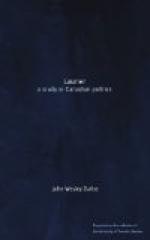This venerable but archaic political system did not survive the war. Beside the loyalties inspired by the war tribal devotion to a party chief seemed a trivial concern. Canadians, who gave first place to the need of getting on with the war, viewed with consternation the readiness of elements in both parties to put their political interests above the safety and honor of the commonwealth. The movement for national political unity was born of their concern and indignation. This development was almost as displeasing to the Conservative partisans as to the Liberal “legitimists,” who upheld the right, under all circumstances, of Laurier to regain the premiership; and it was their inveterate and unthinking opposition that had much to do with the ultimate disruption of the union. They did not realize, until they got into the elections of 1921, that their party had disintegrated under the stresses of war.
A study of the origin, achievements, failures, downfall and consequences of Union government might be of interest, but it does not come into a survey of the life of Laurier. These matters are related to the influences that are now making over Canadian politics; they concern the leaders of to-day, all minor figures in the 1917 drama. Because the Union government passed without leaving behind it tangible and visible manifestations of its power, there are those who regard it as a mere futility—a sword-cut in the water, as the French say. But of the Union movement it might well be said: Si monumentum requiris circumspice. The spirit behind the movement passed with the war, but it left the old traditional party system in ruins. The readjustments that are going on to-day, the efforts at the realignment of parties, the attempt to newly appraise political values, and to redefine political relationships—all these things are testimony to the dissolving, penetrating power of the impulses of 1917.




